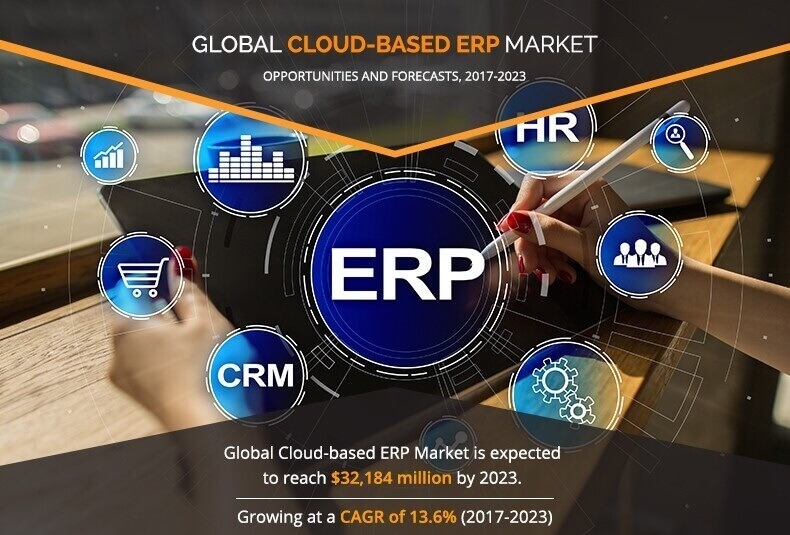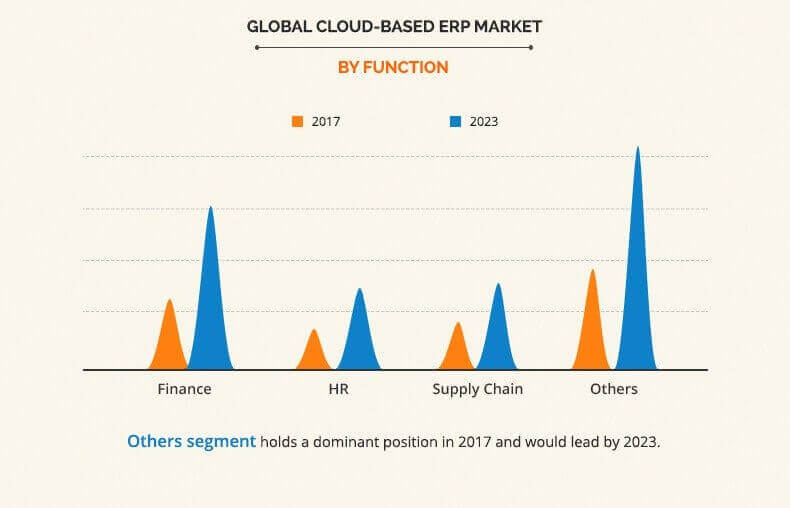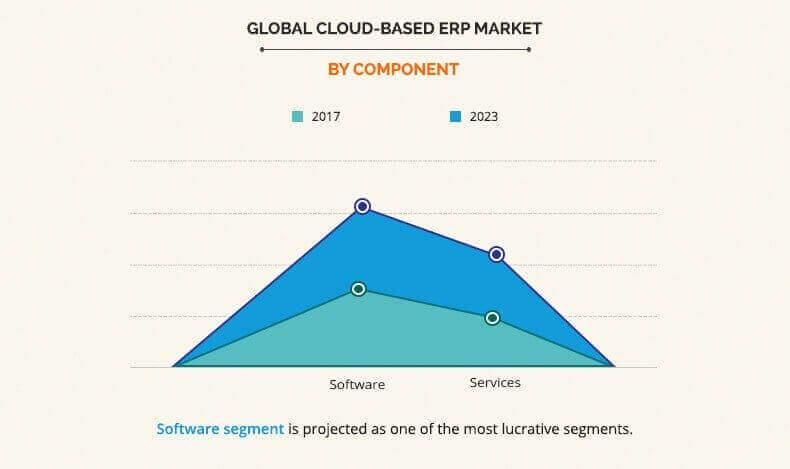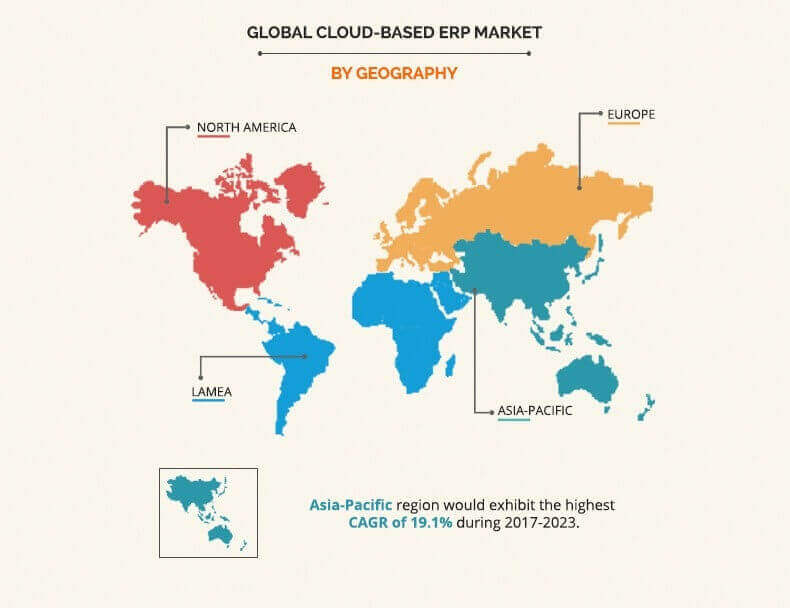Cloud-based Enterprise Resource Planning (ERP) Market Outlook - 2023
The global cloud-based ERP market was valued at $13,238 million in 2016, and is expected to reach $32,184 million by 2023, growing at a CAGR of 13.6% from 2017 to 2023. Enterprise resource planning is a business application, which is useful for enterprises to integrate their business functionalities to achieve high efficiency and productivity. Cloud-based deployment platform has given a significant boost to the enterprise application software during the last few years. Furthermore, it focuses on adoption of cloud-based ERP in various industry verticals such as manufacturing, healthcare, retail, government, BFSI, telecom, and others.
The cloud-based ERP market is segmented based on component, function, end user, industry vertical, and region. By component, the market is categorized into software and services. Services segment is further studied across professional and managed services. As per function the market is classified into finance, HR, supply chain, and others. Based on end user the market is segmented into large, mid-size, and small organization. Based on industry vertical, it is classified into manufacturing & services, BFSI, healthcare, retail, government, aerospace & defense, IT & telecom, and others. Based on region, the market is analyzed across North America, Europe, Asia-Pacific, and LAMEA
The major factors that drive the growth of the market are increase in number of SMEs, need for obtaining higher operative efficiency and realization of competitive advantages achieved through implementation of cloud enterprise resource planning, rapid change in business models, and development in the cloud trend.
The North American cloud enterprise resource planning market generated the highest revenue in 2016, owing to increase in adoption of cloud-based solutions, presence of a large number of enterprises, and rise in the adoption of IoT. The Asia-Pacific cloud-based ERP market is expected to grow at the highest CAGR, owing to increase in penetration of internet and surge in adoption of ERP application in the government agencies. Furthermore, SMEs in the region require technologically advanced solutions to manage departments & functions, which fosters the adoption of the cloud-based enterprise applications.
The key players operating in the cloud enterprise resource planning industry include Oracle, IBM, Microsoft, SAP, Sage Group Plc, QAD Inc., IFS AB, Epicor Software Corp., Infor, and Aptean. These players have expanded their market presence by adopting various business strategies such as acquisition, geographical expansion, product development, strategic alliance, and collaboration.
Top Investment Pockets
The following graph signifies the growth potential of the global cloud-based ERP market by solution. It is observed that the others segment (includes human resource management, environmental resources management, management information system, decision support system, Business continuity planning, collaboration, IT service management, enterprise application integration, and enterprise forms automation), which occupied the largest market share in 2016, drives the market. However, major growth is observed in the content management system (CMS) sector where cloud-based ERP solutions are expected to witness considerable adoption in the near future.
By Deployment
Large number of companies operating in the global cloud enterprise resource planning market offer specific enterprise resource planning solutions as per the requirements of the end-user industries. Selection of enterprise application depends upon factors such as need of enterprise, business size, functional areas, and expected benefits to organizations. Major enterprise resource planning solution available in the market are NetSuit ERP, EcountERP, Brightpearl, and Intacct.
By Region
North America
Companies increasingly invest in the IT sector to implement enterprise application for proper work. Adoption of enterprise application leads to enhanced business performance. However, adoption of cloud enterprise resource planning depends on business requirement, as it reduces operational costs and helps the organization to perform multiple tasks at a time. Cloud-based enterprise resource has witnessed high adoption in North America, owing to established high data processing enterprises in the country such as the U.S. In addition, to leverage the businesses and to enhance the customer experience, enterprises have adopted enterprise resource planning, which fuels the market growth.
Key Benefits of Cloud-based Enterprise Resource Planning (ERP) Market:
- In-depth analysis of the global cloud-based ERP market and dynamics is provided to understand the market scenario.
- Quantitative analysis of the current trends and future estimations from 2017 to 2023 is provided to assist strategists and stakeholders to capitalize on prevailing opportunities.
- Porter’s Five Forces analysis examines the competitive structure of the cloud-based ERP market and provides a clear understanding of the factors that influence the market expansion.
- A detailed analysis of the geographical segments enables identification of profitable segments for market players in the cloud-based ERP industry.
- Comprehensive analyses of the trends, subsegments, and key revenue pockets are provided.
- Detailed analyses of the key players operating in the cloud-based ERP industry and their business strategies are anticipated to assist stakeholders to take informed business decisions.
Cloud-based Enterprise Resource Planning (ERP) Market Report Highlights
| Aspects | Details |
| By Component |
|
| By Function |
|
| By End User |
|
| By Industry Vertical |
|
| By Geography |
|
| Key Market Players | EPICOR SOFTWARE CORPORATION, APTEAN, UNIT4, INFOR, SYSPRO, SAGE GROUP PLC, SAP SE, ORACLE CORPORATION, IBM CORPORATION, MICROSOFT CORPORATION |
Analyst Review
Enterprise Resource Planning (ERP) helps organizations to increase productivity by offering information systems that bind various functions such as inventory management, finance, human resources, and others. With its benefits of low cost, low maintenance and easy expansion, it has the potential to take over the ERP market, and the traditional on premises ERPs. In addition, increase in enterprise mobility and the customized pay-per-usage model creates a potential space for cloud storage solutions.
Emergence of cloud service brokerage further boosts the deployments of cloud ERP among organizations. The ERP prevents data loss or downtime due to localized component failure on cloud and avoids vendor lock-in. The price-sensitivity among cloud users majorly drives the market growth. An effective ERP solution automates the process of an enterprise and leads the company to its desired success and growth. For instance, a major metal machinery company implemented a cloud ERP system to streamline the rapid and ongoing changes within the company. Some of the benefits of this implementation were that the company could check the real time status of their order, stage of production, mobility of the information, email alerts, and overall scenario of the processes in all departments.
However, the infrastructure management of an ERP system can be complex, and needs an efficient management system, thus boosting the requirement for the adoption of cloud-based ERP software and services among IT buyers.
The key market players in the global cloud-based ERP market have adopted various strategies, such as product launches, partnerships, business expansions, promotional activities, and strategic alliances, to increase awareness about newer technologies and increase their adoption across various verticals.
Loading Table Of Content...







